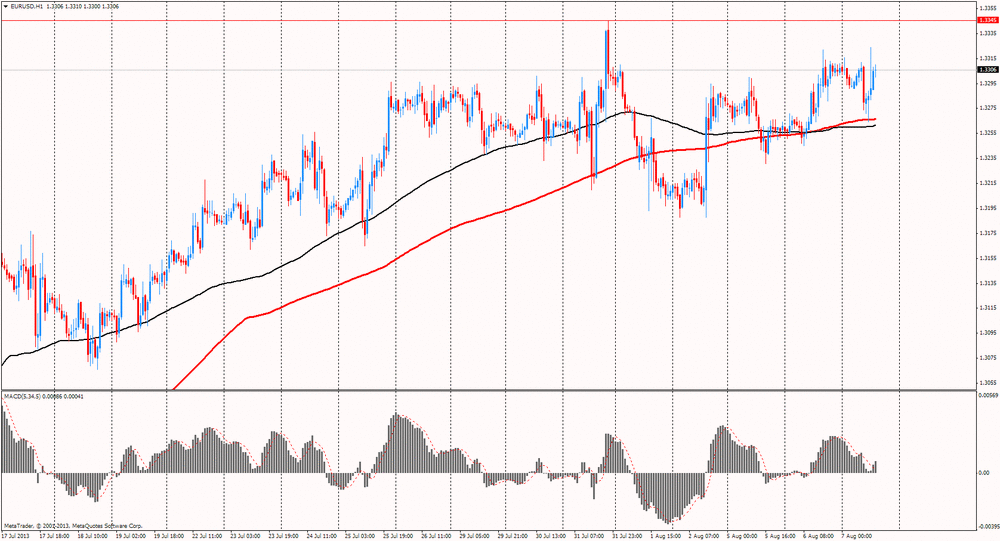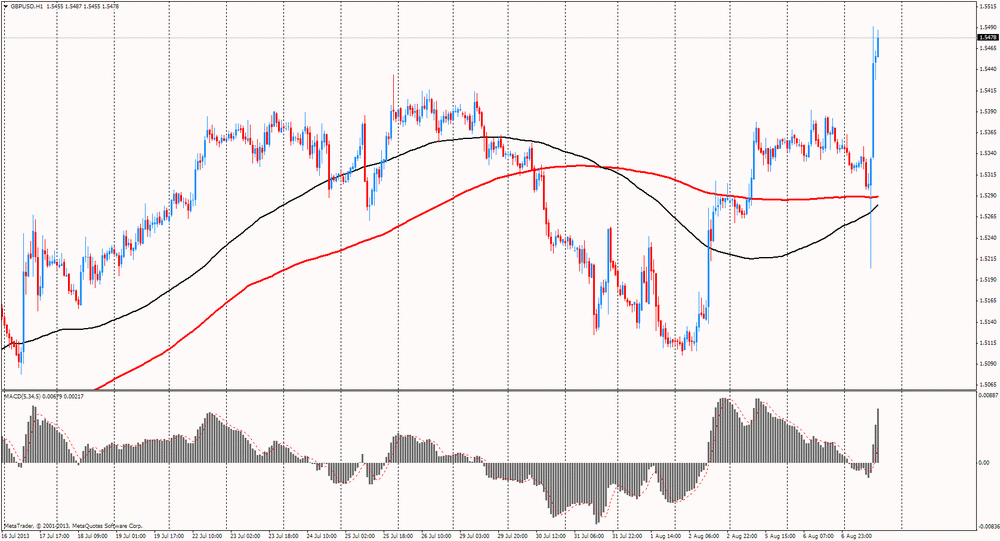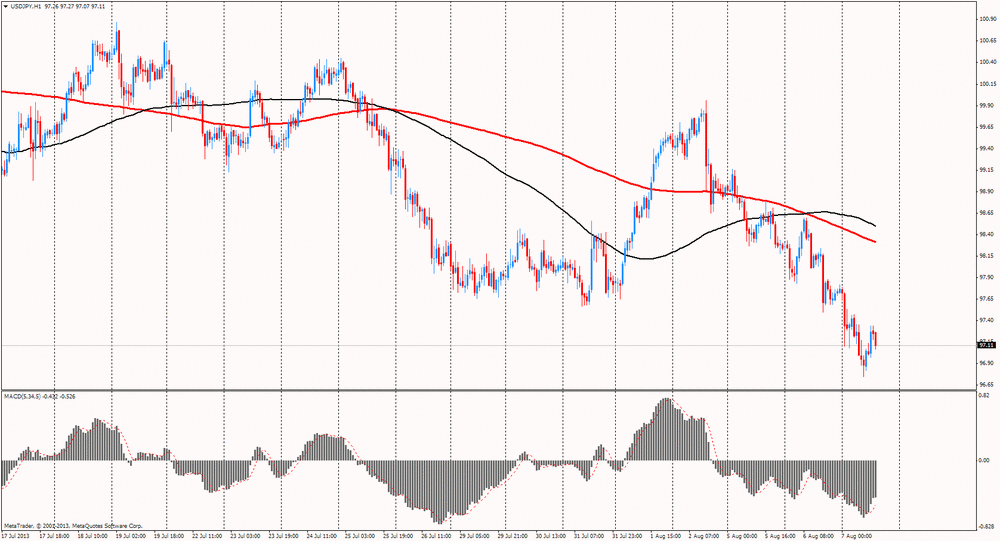Notícias do Mercado
-
20:00
U.S.: Consumer Credit , June 13.8 (forecast 15.3)
-
19:20
American focus: the euro continued to rise
The euro rose sharply against the dollar, helped by positive data from Germany. The Federal Ministry of Economics and Technology reported that as a result of June's industrial production in Germany increased substantially, thereby exceeded the forecasts of most economists.
According to the report, the seasonally adjusted June industrial output rose 2.4% mom, recovering from a fall of 0.8%, which was recorded in the previous month, and revised downward. It is worth noting that according to the average estimates of experts industrial output had increased by only 0.3%, compared with the initial estimate of May at 1% decline.
In addition, it was reported that the volume of production, with the exception of the construction sector rose in June by 2.2% on a monthly basis. It should be noted that production in the construction sector was 1.6% more than in the previous month.
Compared with June 2012, industrial output adjusted for the number of working days, increased by 2%, after a 1.2% decline in May, which was revised down from 1% reduction. Add that economists estimate that industrial production was down by 0.3% per annum.
In addition, support for the single currency was a message stating that the agency Fitch Affirms Germany at 'AAA' with a stable outlook. Fitch said that the German government has exceeded the plan by some key financial goals. In 2012, the government structural balance was in surplus for the first time since reunification.
Fitch also believes that the debt / GDP ratio reached a peak. "Germany has all the ingredients to reduce the national debt - said in a statement. - The economy is growing, the state budget is relatively favorable, nominal interest rates at low levels. In addition, despite the fact that the debt / GDP ratio of 81.9% is higher than average for countries with a rating of 'AAA', 49%, it is within the acceptable range. "
The yen rose against the start today of the Bank of Japan. It is expected that the bankers will refrain from expanding existing monetary stimulus to devalue the yen this year against the dollar by 11%. Recall that in the present Central Bank of Japan monthly purchases of more than 7 trillion yen ($ 72 billion) of government bonds to two years to disperse percent inflation rate to 2%.
Additional impact on the market have the statements of the last Dallas Fed Richard Fisher, and Chicago Fed President Charles Evans. In particular, Richard Fisher, one of the chief critics of QE, said that the Fed is close to the beginning of the process of reducing the volume of quantitative easing, while Charles Evans said that does not rule out the possibility of narrowing the program of redemption of bonds on which month is spent $ 85 billion, already at the September meeting.
The British pound rose significantly against major currencies, which was associated with the application of the Bank of England, which revealed the plans for the future monetary policy of the central bank, noting that the key interest rate will remain at a record low of 0.5% until while the unemployment rate in the UK has fallen to 7%.
Add that also helped strengthen the currency of the Bank of England comments Mark Carney, who said that gross domestic product will not reach its pre-crisis level in the coming year. He also added that the Monetary Policy Committee will continue to pursue a policy change to secure economic growth.
The transition to economic thresholds is another innovation in the policies of the Bank of England. While the economy is showing signs of strengthening, the central bank said the new tactic is to reduce the risk of "premature" increase in short-term rates and help ensure recovery.
In addition, the monetary policy committee predicts that the most likely in the next 18-24 months, the consumer price inflation will be 0.5 percentage points higher than the 2% target, and can grow even stronger. Medium-term inflation expectations can no longer be called sustainable. The Bank of England said that if the threshold is breached, it will not mean an automatic increase in interest rates.
The central bank forecasts that economic growth will be 0.5 percent this quarter after expanding 0.6 percent in the previous three months. Gross domestic product in 2013 and 2014 will rise to 1.5 percent and 2.7 percent respectively.
-
15:30
U.S.: Crude Oil Inventories, July -1.3
-
15:00
Canada: Ivey Purchasing Managers Index, July 48.4 (forecast 56.3)
-
14:44
Option expiries for today's 1400GMT cut
EUR/USD $1.3115, $1.3200, $1.3250, $1.3270/75, , $1.3300, $1.3330, $1.3400
USD/JPY Y96.95, Y98.60
GBP/JPY Y150.35, Y150.50
GBP/USD $1.4980, $1.5300, $1.5325, $1.5400, $1.5480, $1.5500
EUR/GBP stg0.8570, stg0.8600, stg0.8700
EUR/CHF Chf1.2310, Chf1.2400
AUD/USD $0.8950, $0.9000, $0.9030, $0.9130
EUR/AUD A$1.4950
-
14:29
Bank of England kept its interest rate unchanged
The Bank of England released its interest rate decision today. The BoE's interest rate remained unchanged at 0.50% and asset purchase facility program at £375 billion. This decision was widely expected.
Britain's central bank released no statement. Investors will have to wait for the release of MPC votes on August, 20 to know if any MPC members voted in favour of hiking interest rate.
Market participant expect the BoE will raise its interest rate at the end of this year or in the early months in 2015.
Britain's economy is doing well this year. The economy expanded by an annualized 3.2% in the second quarter. The unemployment rate dropped to 6.5% in May. Annual inflation was 1.9% (BoE's target: 2%). But wage growth is very slow. Wages increased 0.7% in the three months to May.
-
13:30
Canada: Building Permits (MoM) , June -10.3% (forecast +6.2%)
-
13:15
European session: the British Pound has increased significantly
Data
01:30 Australia Home Loans June +1.8% +2.2% +2.7%
01:30 Australia RBA Assist Gov Debelle Speaks
05:45 Switzerland SECO Consumer Climate Quarter II -5 -2 -9
06:45 France Trade Balance, bln June -6.0 -5.0 -4.44
07:00 Switzerland Foreign Currency Reserves July 434.9 431.0 434.9
07:15 Switzerland Consumer Price Index (MoM) July +0.1% -0.3% -0.4%
07:15 Switzerland Consumer Price Index (YoY) July -0.1% -0.1% 0.0%
09:30 United Kingdom BOE Gov Mark Carney Speaks
09:30 United Kingdom BOE Inflation Letter Quarter III
10:00 Germany Industrial Production s.a. (MoM) June -0.8% Revised From -1.0% +0.3% +2.4%
10:00 Germany Industrial Production (YoY) June -1.0% -0.3% +2.0%
The euro rose sharply against the dollar, helped by positive data from Germany. The Federal Ministry of Economics and Technology has reported that up to the month of June, industrial production in Germany increased substantially, thereby exceeded the forecasts of most economists.
According to the report, the seasonally adjusted June industrial output rose 2.4% mom, recovering from a fall of 0.8%, which was recorded in the previous month, and revised downward. It is worth noting that according to the average estimates of experts industrial output had increased by only 0.3%, compared with the initial estimate of May at 1% decline.
In addition, it was reported that the volume of production, with the exception of the construction sector rose in June by 2.2% on a monthly basis. It should be noted that production in the construction sector was 1.6% more than in the previous month.
Compared with June 2012, industrial output adjusted for the number of working days, increased by 2%, after recording 1.2% decline in May, which was revised down from 1% reduction. Add that economists estimate that industrial production was down by 0.3% per annum.
The yen fell, departing from the six-week high against the background of which began today of the Bank of Japan. It is expected that the bankers will refrain from expanding existing monetary stimulus to devalue the yen this year against the dollar by 11%. Recall that in the present Central Bank of Japan monthly purchases of more than 7 trillion yen ($ 72 billion) of government bonds to two years to disperse percent inflation rate to 2%.
Additional impact on the market have the statements of the last Dallas Fed Richard Fisher, and Chicago Fed President Charles Evans. In particular, Richard Fisher, one of the chief critics of QE, said that the Fed is close to the beginning of the process of reducing the volume of quantitative easing, while Charles Evans said that does not rule out the possibility of narrowing the program of redemption of bonds on which month is spent $ 85 billion, already at the September meeting.
The British pound rose significantly against major currencies, which was associated with the application of the Bank of England, which revealed the plans for the future monetary policy of the central bank, noting that the key interest rate will remain at a record low of 0.5% until while the unemployment rate in the UK has fallen to 7%.
Add that also helped strengthen the currency of the Bank of England comments Mark Carney, who said that gross domestic product will not reach its pre-crisis level in the coming year. He also added that the Monetary Policy Committee will continue to pursue a policy change to secure economic growth.
The transition to economic thresholds is another innovation in the policies of the Bank of England. While the economy is showing signs of strengthening, the central bank said the new tactic is to reduce the risk of "premature" increase in short-term rates and help ensure recovery.
In addition, the monetary policy committee predicts that the most likely in the next 18-24 months, the consumer price inflation will be 0.5 percentage points higher than the 2% target, and can grow even stronger. Medium-term inflation expectations can no longer be called sustainable. The Bank of England said that if the threshold is breached, it will not mean an automatic increase in interest rates.
The central bank forecasts that economic growth will be 0.5 percent this quarter after expanding 0.6 percent in the previous three months. Gross domestic product in 2013 and 2014 will rise to 1.5 percent and 2.7 percent respectively.
EUR / USD: during the European session, the pair rose from $ 1.3264 to $ 1.3324
GBP / USD: during the European session, the pair fell to $ 1.5205, after which rose to $ 1.5490
USD / JPY: during the European session, the pair rose from Y96.75 to Y97.33
At 12:30 GMT Canada will report on changes in the volume of building permits issued in June. At 14:00 GMT Canada will present from Ivey PMI index for July. At 17:00 GMT the United States places the 10-year bonds. At 23:50 GMT Japan will report on the overall current account balance and the adjusted total current account surplus in June.
-
13:00
Orders
EUR/USD
Offers $1.3385-410, $1.3353, $1.3345/50, $1.3330
Bids $1.3245/40, $1.3235/30, $1.3220/10, $1.3205/190, $1.3180
AUD/USD
Offers $0.9050, $0.9035/40, $0.9010/20, $0.9000, $0.8965/70
Bids $0.8907, $0.8900, $0.8880/75, $0.8820, $0.8800
GBP/USD
Offers $1.5430/35, $1.5420, $1.5400, $1.5382-86
Bids $1.5310/00, $1.5290, $1.5250/45, $1.5205/190, $1.5175
EUR/GBP
Offers stg0.8810/15, stg0.8790/00, stg0.8745, stg0.87305
Bids stg0.86475, stg0.8645/40, stg0.8605/595, stg0.8585/80
EUR/JPY
Offers Y130.50, Y130.00, Y129.55/60, Y129.20/30
Bids Y128.50, Y128.00, Y127.50, Y127.20, Y127.00
USD/JPY
Offers Y98.50, Y98.20, Y98.00, Y97.45/50, Y97.25/30
Bids Y96.50, Y96.20, Y96.00, Y95.80
-
11:01
Germany: Industrial Production (YoY), June +2.0% (forecast -0.3%)
-
11:00
Germany: Industrial Production s.a. (MoM), June +2.4% (forecast +0.3%)
-
10:25
Option expiries for today's 1400GMT cut
UER/USD $1.3115, $1.3200, $1.3250, $1.3270/75, , $1.3300, $1.3330, $1.3400
USD/JPY Y96.95, Y98.60
GBP/JPY Y150.35, Y150.50
GBP/USD $1.4980, $1.5300, $1.5325, $1.5400, $1.5480, $1.5500
EUR/GBP stg0.8570, stg0.8600, stg0.8700
EUR/CHF Chf1.2310, Chf1.2400
AUD/USD $0.8950, $0.9000, $0.9030, $0.9130
EUR/AUD A$1.4950
-
08:16
Switzerland: Consumer Price Index (MoM) , July -0.4% (forecast -0.3%)
-
08:16
Switzerland: Consumer Price Index (YoY), July 0.0% (forecast -0.1%)
-
08:01
Switzerland: Foreign Currency Reserves, July 434.9 (forecast 431.0)
-
07:45
France: Trade Balance, bln, June -4.44 (forecast -5.0)
-
07:01
Asian session: The yen touched a six-week high
01:30 Australia Home Loans June +1.8% +2.2% +2.7%
01:30 Australia RBA Assist Gov Debelle Speaks
The yen touched a six-week high as the Bank of Japan starts a meeting today on prospects it will refrain from adding to unprecedented stimulus that’s helped to weaken the currency 11 percent against the dollar this year. The BOJ will probably remain on hold when concluding its two-day meeting tomorrow, according to all 25 economists surveyed by Bloomberg News. The central bank currently buys more than 7 trillion yen ($72 billion) of government bonds every month in its plan to foster 2 percent annual inflation in two years.
Fed Bank of Chicago President Charles Evans, who has been among the most vocal proponents of monetary accommodation, said there has been “good improvement” in the labor market and indicated that tapering of stimulus in September is possible.
The pound maintained a decline versus the euro before Bank of England Governor Mark Carney speaks today about implementing forward guidance aimed at anchoring interest rates. Carney will discuss the Monetary Policy Committee’s analysis of steering expectations today when the BOE presents its quarterly Inflation Report. The central bank said on July 4 that the expected increase in future interest rates was “not warranted by the recent developments in the domestic economy.”
The euro was 0.4 percent from a seven-week high against the dollar before German data forecast to show industrial production rose.
EUR / USD: during the Asian session the pair fell to $ 1.3290
GBP / USD: during the Asian session the pair fell to $ 1.5320
USD / JPY: during the Asian session the pair fell to Y97.10
Although there are data releases on both sides of the Atlantic Wednesday, the stand out factor will be the latest Bank of England Quarterly Inflation Report and the first QIR press briefing from Governor Mark Carney. Early data to be released from Paris includes the July Bank of France business survey and the French June foreign trade data, due at 0630GMT and the 0645GMT respectively. At 0715GMT, the Switzerland July CPI data will cross the wires. At 1000GMT, the German June industrial output data will be published. The BOE's August QIR will be released at 0930GMT, to be followed immediately by the Governor's press conference. Across the Atlantic, the US calendar gets underway at 1100GMT, with the release of the MBA Mortgage Index data for the August 2 week. The Canadian data releases get underway from 1230GMT, when the June building permits data will be released, with economists looking for a reading of -2.8% versus +4.5% in May. At 1400GMT, the July IVEY PMI reading is set to cross the wires, with an expected reading of 57.0. At 1430GMT, the EIA Crude Oil Stocks data for the week ending August 2 are expected. There are only limited appearances slated from Fed officials, although 1740GMT sees Cleveland Federal Reserve Bank President Sandra Pianalto deliver a speech in Cleveland. Late data sees the US June Consumer Credit numbers and the July Treasury allotments released at 1900GMT.
-
06:45
Switzerland: SECO Consumer Climate, Quarter II -9 (forecast -2)
-
06:20
Currencies. Daily history for Aug 6'2013:
(pare/closed(00:00 GMT +02:00)/change, %)
EUR/USD $1,3307 +0,35%
GBP/USD $1,5349 -0,05%
USD/CHF Chf0,9257 -0,19%
USD/JPY Y97,77 -0,48%
EUR/JPY Y130,10 -0,15%
GBP/JPY Y150,04 -0,53%
AUD/USD $0,8980 +0,53%
NZD/USD $0,7904 +0,68%
USD/CAD C$1,0374 +0,15%
-
05:59
Schedule for today, Wednesday Aug 7’2013:
01:30 Australia Home Loans June +1.8% +2.2%
01:30 Australia RBA Assist Gov Debelle Speaks
05:45 Switzerland SECO Consumer Climate Quarter II -5 -2
06:45 France Trade Balance, bln June -6.0 -5.0
07:00 Switzerland Foreign Currency Reserves July 434.9 431.0
07:15 Switzerland Consumer Price Index (MoM) July +0.1% -0.3%
07:15 Switzerland Consumer Price Index (YoY) July -0.1% -0.1%
09:30 United Kingdom BOE Gov Mark Carney Speaks
09:30 United Kingdom BOE Inflation Letter Quarter III
10:00 Germany Industrial Production s.a. (MoM) June -1.0% +0.3%
10:00 Germany Industrial Production (YoY) June -1.0% -0.3%
12:30 Canada Building Permits (MoM) June +4.5% +6.2%
14:00 Canada Ivey Purchasing Managers Index July 55.3 56.3
14:30 U.S. Crude Oil Inventories July +0.4
19:00 U.S. Consumer Credit June 19.6 15.3
23:50 Japan Current Account (adjusted), bln June 623.3 727.3
-


